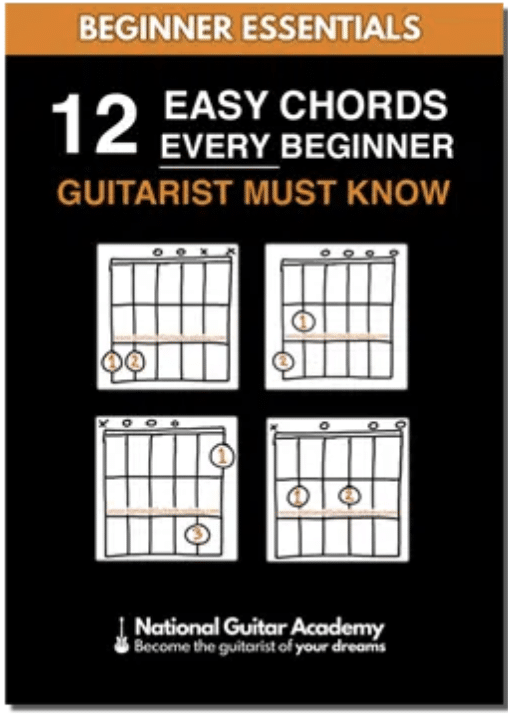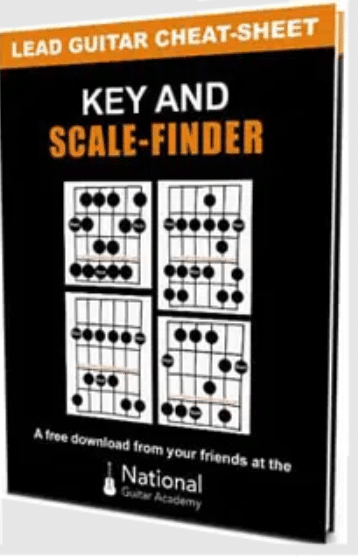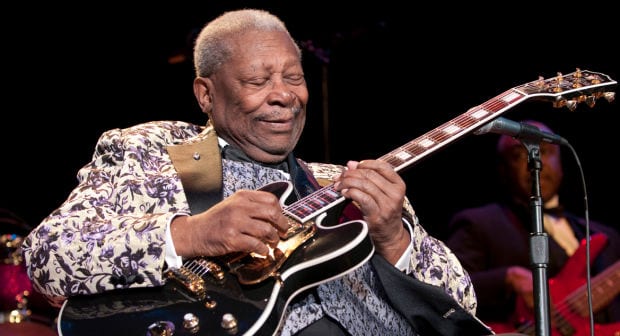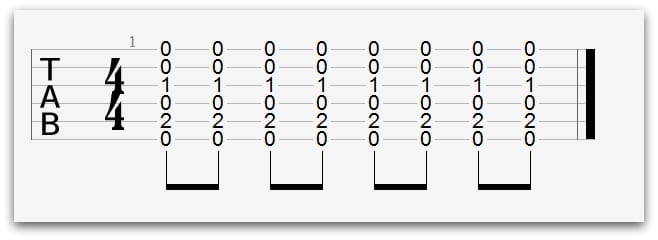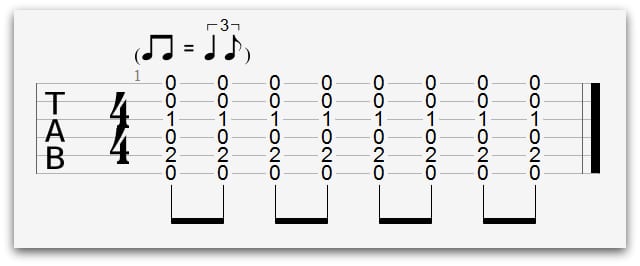Using other scales when improvising over a blues
This is an advanced tip!
When improvising the blues you can use a major scale which is two frets below the root note.
So for example, if you were playing an E blues, the E root note is at the 12th fret on the low E string.
If you go down two frets, you get to the 10th fret of the E string.
The note on the 10th fret of the E string is the note D.
Therefore you would play a D major scale.
This works because the D major scale, shares a lot of the same notes from a E blues scale.
Here’s how to play a D major scale:
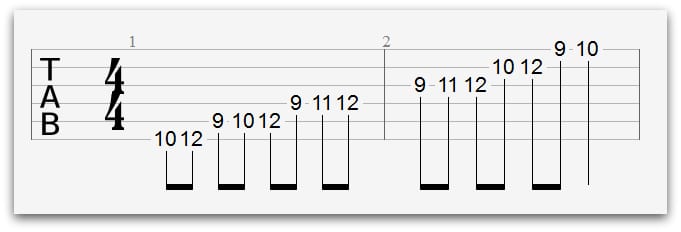
- Put on your E blues backing track.
- Try improvising with the D major scale.
You could also try this idea over a A blues.
The 5th fret on the E string is the note A.
So if you go down two frets from here, you get to the note G.
So this time, over a A blues, you would play a G major scale over a A blues.
Here is what a G major scale looks like:

Blues guitar riffs
Blues scale are useful for a number of things, guitarists will often uses scales to write guitar riffs.
A excellent example of this is the main riff of ‘Sunshine of your love’ by Cream.
This riff is a great example of how you can use the blues guitar scale to create a bluesy riff!
Let’s check out the original tune:
Here’s the tab:
In this video, Jack shows you how to play to this awesome blues guitar riff.
Advanced Blues Scales
Both of the blues guitar scales you’ve just learnt use open strings. However, if you fancy an added challenge, you can also play this scale further up the neck.
Here’s what a A blues scale would look like if it was played in a ‘closed’ position.
Can you hear how it’s the same scale? All we’re doing here is playing the scale in a different position.
The Minor Pentatonic Scale
Another common scale which blues guitarists use, is the minor pentatonic scale.
If you’re looking to learn more about blues guitar, this scale is vital for your progress as a blues guitar player!
Here’s the scale in the key of A:
If you’d like to know more about how to play guitar scales, this article will be a huge help: Learn Guitar Scales In 8 Easy Steps
Moveable Scale Patterns
The great thing about advanced blues guitar scales, is that you can move these shapes all over the fret board.
All you have to do is change the scale’s starting note.
For this exercise, we’re just concerned about moving our starting note to a different fret.
So for example, if we wanted to play a C blues scale, we would move our scale to the 8th fret of the low E string.
Or let’s say we wanted to play a G blues scale, we would start our scale on the 3rd fret of the low E string.
This is advanced stuff, so don’t worry if you don’t understand it right now. It’s just useful to be aware of these kind of things!
However, if this does interest you, you can find more of this content here: How To Play Lead Guitar
What is the blues?
If you’re new to blues guitar, you might actually be unaware of what the blues genre is.
A lot of blues music, tends to be centered around issues such as love, loss and life’s hardship.
That’s why when you listen to the genre, it has deep soulful sound, with strong rhythms and melodies.
The genre tends to stick to a similar chord progression, this is what’s known as the 12 bar blues! As well as this, the blues is fantastic for learning improvisation!
What is blues guitar?
Blues music these days is very guitar focused, there have been 100s of artists over the last decade who have played blues guitar.
It’s quite hard to put into words what blues guitar is, though it could be simply described as music that uses major chords but with minor melodies over the top.
B.B King can say a thousand words by just playing a few notes.
Here’s a clip of his playing, there’s a reason why he’s known as the king of the blues!
As you can see this from this clip, blues guitar has a deep soulful sound, from my own experience I found that playing blues guitar was a great way to express myself musically.
It acts as a fantastic platform for improvisation.
There are loads of fantastic blues guitarists out there, here a list of the 30 greatest blues guitarist of all time by MusicRadar!
The 30 greatest blues guitars of all time
Rhythm vs Lead – What’s the difference?
In blues guitar, we often get two types of guitarists.
Rhythm and lead
A rhythm guitarist will often play chords and provide the back bone of the rhythm section in a band.
Where as the lead guitarist will often play solos and lead lines.
Without rhythm, a blues band would be nothing!
There are a few fundamental blues rhythms you can play to make you instantly sound like a blues rhythm machine. Let’s learn a few.
Blues strumming pattern – The ‘Straight’ One
This strumming pattern is fairly straight. It doesn’t feel lazy or too fast, it’s a nice solid straight strumming pattern.
For this exercise, I’ve just used the E7 chord.
Here’s the strumming pattern:
Here’s what it sounds like:
Make sure that when you strum this pattern, you do it with all down strokes. Your rhythms need to be driving along!
You can think of this strumming as:
1 and 2 and 3 and 4 and
You can learn more about how to strum here: How To Strum A Guitar
Blues guitar strumming pattern – The ‘Lazy’ One
This next strumming pattern sounds a little bit lazy. It’s very similar to the first pattern, however the ‘and’ is a little later.
This gives the chords a cool, lazy feel. This is perfect, if you’re playing a slow blues.
Here’s the tab:
Here’s what it sounds like:
Make sure you’re nice and loose when you play this pattern! You want to be super relaxed.
Take our 60-second quiz & get your results: Take The Quiz Click here to learn more about National Guitar Academy membership Look cooler! Check out our merch: Click here to see our merch store Join over 100,000 guitar-learners and subscribe to our guitar-tips-by-email service. (It's free.) We'll send you a series of lessons that will move you to the next level of your guitar journey. Learn how everything fits together quickly, easily and effectively. We share ninja tips (for instant fun!) but also timeless fundamentals that will deepen your understanding.What Type of Guitarist Are You?
Join the world's best online guitar school 🌎
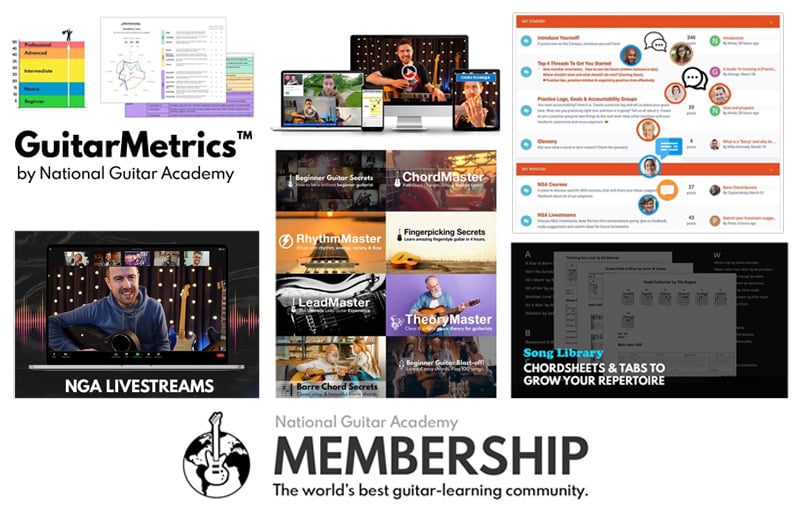
Cool Guitar T-shirts 😎
Want free guitar tips and video lessons delivered to your inbox?


Get our best guitar tips & videos
How To Learn Guitar: An 11-Step Programme For Beginners How To Choose The Perfect Beginner Guitar Learn about National Guitar Academy: About Us Join us on Facebook for daily guitar tips. Listen to our Learn Guitar Podcast for rapid guitar progress. Check out our free chord lessons.Popular Lessons
More Cool Guitar Stuff

